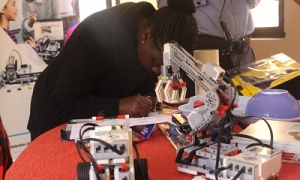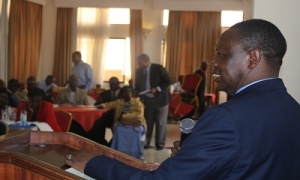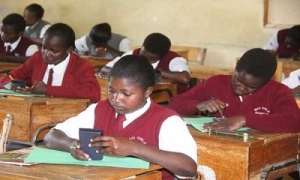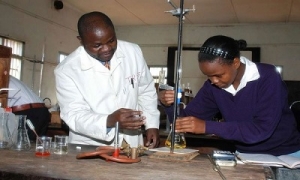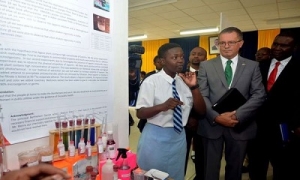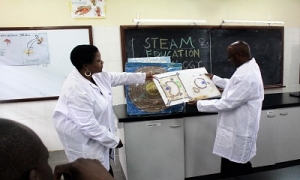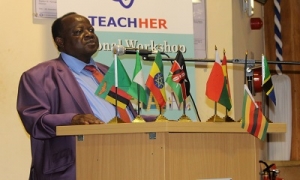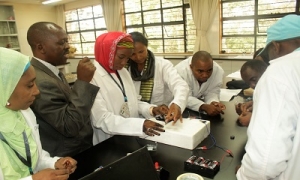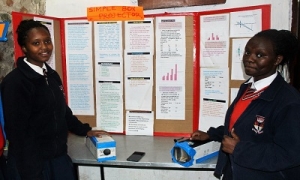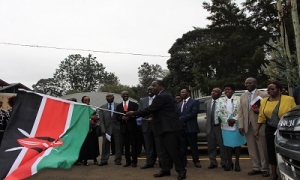By: Augustine Oduor
August 26 2017
The government is equipping selected secondary schools with modern learning tools that will make Mathematics and Science easy and enjoyable. Each of the 102 schools selected in every county will get modern equipment for Biology, Chemistry, Mathematics, Physics and Information and Communication Technology.
The items are part of the Science, Technology, Engineering and Mathematics (STEM) project being implemented by the Ministry of Education. The programme is being rolled out by the Centre for Mathematics, Science and Technology Education in Africa (CEMASTEA). At least two schools were selected in each of the 47 counties for the pilot stage.
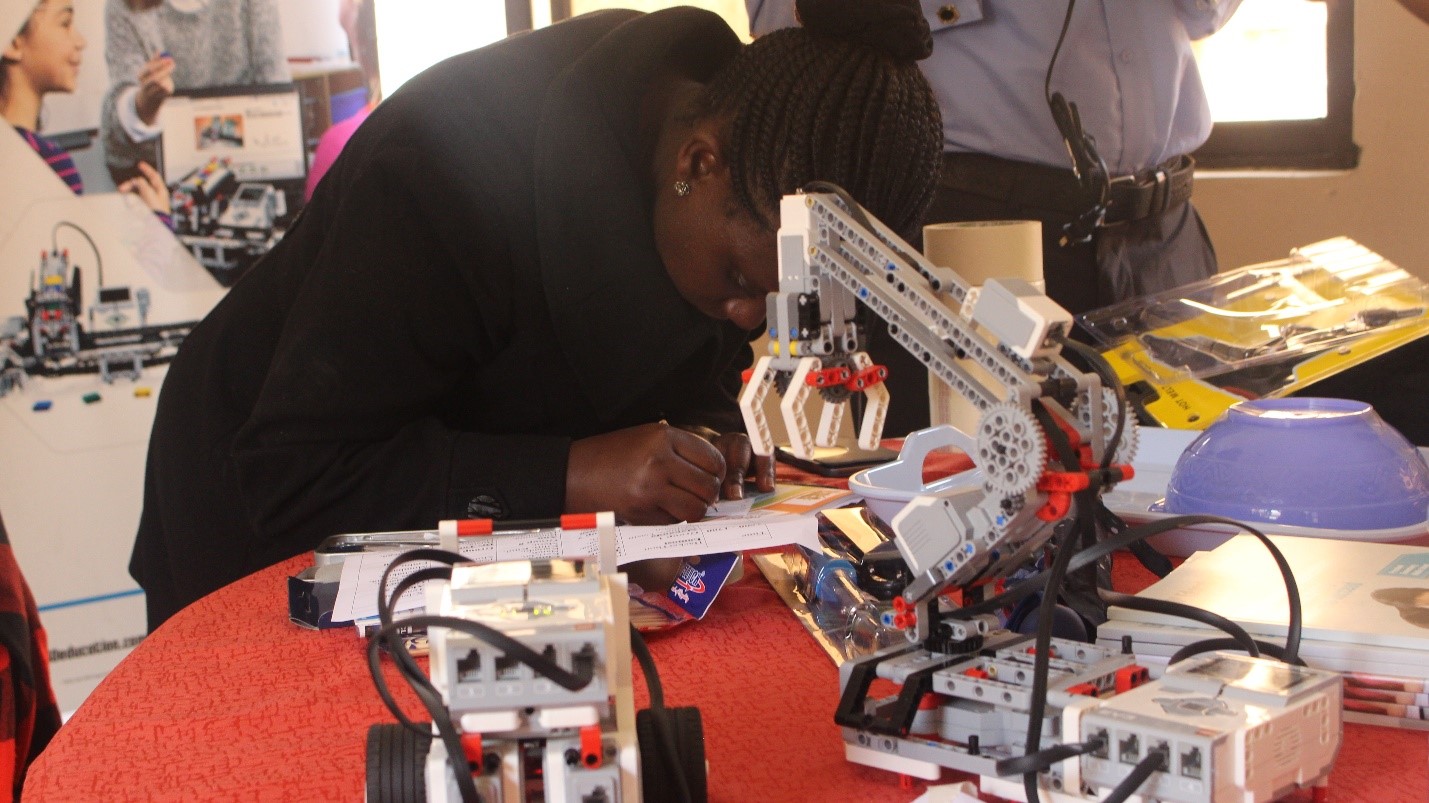
Esther Nyambura ICT officer CEMASTEA interacting with robots during The STEM Sensitization workshop. [Dan Orero/CEMASTEA]
The Ministry of Education initiated the Stem Model Schools intervention programme to enhance learners’ capability in Science and Mathematics, CEMASTEA Director, Mr Stephen Njoroge said each of the selected schools will get laptops, LCD projectors, digital cameras, white-boards, light microscopes, photometers, biological models, and preserved specimens. Also, to be provided are thermometers and stop watches to make learning cool. Mr Njoroge said the Government has already started to procure the modern learning equipment
“We are going to provide modern Chemistry, Physics And Biology leaning materials to schools at an estimated cost of Sh54 million,” said Mr Njoroge
CEMASTEA was allocated Sh32 million in the 2016/2017 financial year to implement the project. In the 2017/2018 financial year, the centre has been allocated Sh58 million. The centre has already developed a Stem module and is conducting training of teachers and sensitization of stakeholders. The training will end this month, Mr Njoroge said more than 306 teachers have undergone one-week training ahead of the roll out. The training was conducted in Nakuru, Eldoret, Mombasa, Nyeri, Embu, Kakamega, Kisumu, and Thika.
Thursday August 24, 2017
By Ouma Wanzala
Teaching of science subjects in secondary schools is set to be done through the use of ICT as the government steps up efforts to make learning attractive
Procurement of modern learning equipment such as laptops and LCD for use in teaching has begun under an ambitious programme that targets more than 100 schools.
“We are going to provide modern chemistry, physics and biology learning material to schools at an estimated cost of sh54 million,” said Mr. Stephen Njoroge, the director of the centre for Mathematics, Science and Technology Education in Africa (CEMASTEA)
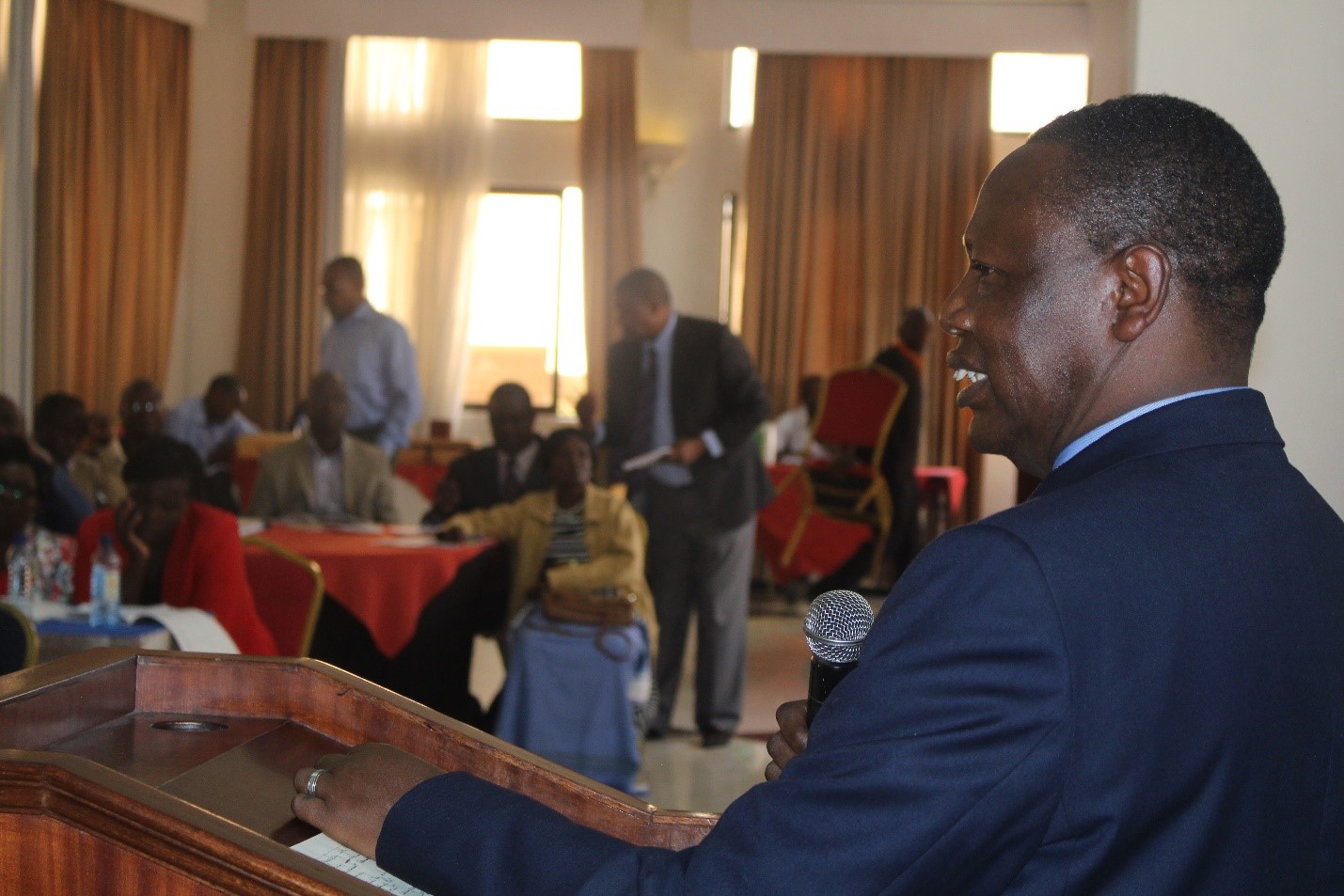
Mr. Stephen Njoroge Director, CEMASTEA addressing School principals and BOM during the STEM Sensitization workshop. [Dan Orero/CEMASTEA]
Mr. Njoroge said the initiative also aims to ensure learning of science subjects in schools is
hands-on and students can create jobs while still in school. More than 306 teachers from the 102 model schools have since undergone a one-week training course to prepare them for the rollout. The training was conducted in Nakuru, Eldoret, Mombasa, Nyeri, Embu, Kakamega, Kisumu and Thika.
Change methods
The initiative spearheaded by CEMASTEA seeks to set up Science, Technology, Engineering And Mathematics (STEM) model schools and changing the way the subjects are taught.
Statistics show 22 per cent of students at local universities are taking science courses, compared to 70 per cent in the “Asian Tiger” nations such as South Korea and Singapore.
Most schools ignore holistic learning, says report
WEDNESDAY AUGUST 9 2017
By OUMA WANZALA
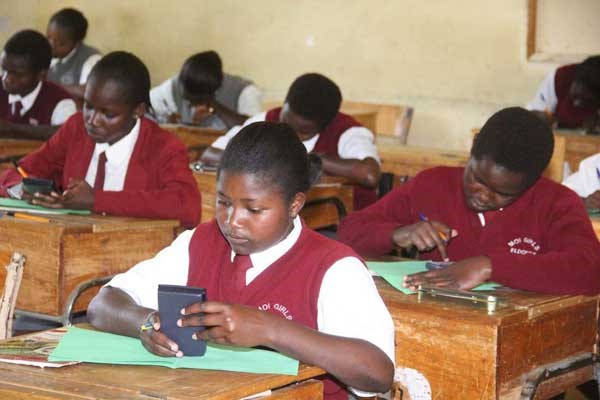
Wilbroda Oleroh (centre), from Moi Girls’ High School in Uasin Gishu County and other students during the National Math Contest at AIC Chebisaas Boys High School in Eldoret on July 11, 2015. PHOTO | JARED NYATAYA | NATION MEDIA GROUP
In Summary
- The government has stepped up promotion of science-related subjects in secondary schools across the country.
- Vision 2030 is premised on more students taking up mathematics and science in the hope that this will drive scientific inquiry and innovation.
- Already, more than 306 teachers have been lined up for training starting August 14 to 18 in eight regions across the country.
ADVERTISEMENT
Secondary schools are only focusing on academic excellence and giving less focus on producing all-round students who can serve the society, a report has revealed.
The report indicates that in most schools, vision, mission and motto are about the institutions being Centre of academic excellence.
The study conducted by the Centre for Mathematics, Science and Technology Education in Africa (CEMASTEA) show that academic performance was at 58 per cent, holistic view at 27 per cent, character or value system at 10 per cent and national goal and aspiration at five per cent.
The holistic view is about making a student an epitome of physical, moral, spiritual and academic excellence while the national goal and aspiration seeks to provide quality education to students and prepare them for national development.
ACADEMIC PERFORMANCE
At the same time, character or value system is about producing an educated, disciplined and determined person ready to serve while academic performance is about being a leader in academic excellence.
Related Content
“In most schools vision, mission and motto are just statement to fulfill statutory requirements with little evidence of efforts to make the vision an integral and vibrant facet of the school community,” notes the report that was released recently during a school heads and boards of management workshop in Nakuru.
The aspirations were generally used to refer to what the school owners or managers wanted the students to achieve at the end of their four-year period in school.
“There is a need for the Science, Technology, Engineering and Mathematics (STEM) model schools to adjust their vision to reflect the aspiration for becoming an effective model school,” recommends the report.
The government has stepped up promotion of science-related subjects in secondary schools across the country.
POOR INFRASTRUCTURE
Some of the challenges that have been identified are poor school infrastructure, school climate, under-staffing, inadequate teaching and learning resources, poor attitude by both teachers and students and lack of role models.
Vision 2030 is premised on more students taking up mathematics and science in the hope that this will drive scientific inquiry and innovation.
Already, more than 306 teachers have been lined up for training starting August 14 to 18 in eight regions across the country.
Statistics indicate that its only 22 per cent of students in universities that are taking science-related courses compared to 70 per cent of students in South Korea and Singapore.
CEMASTEA Director, Mr Stephen Njoroge said schools that have been identified are required to work closely with others not in the programme in their counties.
SUNDAY AUGUST 6 2017
By OUMA WANZALA
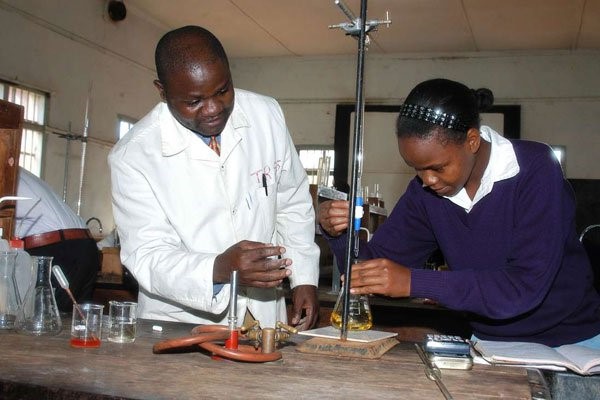
A student from Temple Road Secondary School in Nyeri is assisted by her teacher during a chemistry lesson on May 12, 2010. PHOTO | JOSEPH KANYI | NATION MEDIA GROUP
Teachers play a key role in encouraging or discouraging students from taking up science subjects in secondary school, a new report has shown.
The study, conducted by the Centre for Mathematics, Science and Technology Education in Africa (CEMASTEA), shows teachers routinely advise students they consider weak not to take up science courses, when they should be encouraging them instead.
Other challenges identified include poor school infrastructure. Also, many schools were not proactive in entrenching the study of science. For instance, the study found that about 117 pieces of science equipment donated to one of the Science, Technology, Engineering and Mathematics (STEM) model schools last year had never been put to use.
“Let’s use this equipment,” said CEMASTEA Director, Mr Stephen Njoroge during the launch of the report last week.
Vision 2030 is premised on more students taking up mathematics and science in the hope that this will drive scientific inquiry and innovation. Launched last year, the STEM programme is expected to inspire learners to excel and pursue careers related to science and mathematics.
To address the challenges in science education in secondary schools, the government has embarked on an ambitious programme that seeks to update these subjects. The initiative, spearhead by CEMASTEA, seeks to fill the gaps by setting up STEM model schools across the country and changing the way the subjects are taught.
It also includes setting up of a special class dubbed ‘Makerspace’, where students pursuing the subjects will be able to innovate and enjoy a hands-on approach to teaching and learning. This is expected to enable students in the 102 schools to carry out activities such as robot building (Robotics), learning circuits and electricity with paper circuits, sewing, wood working and inventing.
The STEM programme was introduced in public schools last year, with one school being selected as a model in every county based on centrality, performance, STEM culture and leadership.
The survey also revealed how candidates in secondary schools have continued to perform below the mean score in science-related subjects in national examinations over the years. It shows that the overall school performance has grown gradually between 2006 and 2015. It is only in 2007 that the mean score in biology shot above the overall mean. In all the other STEM subjects, the mean score was below the overall mean, indicating that in most schools, mathematics and science were at the bottom.
The study was conducted last year and released last week during a workshop for the board of management and principals of 102 schools in Nakuru.
THURSDAY AUGUST 3 2017
By OUMA WANZALA
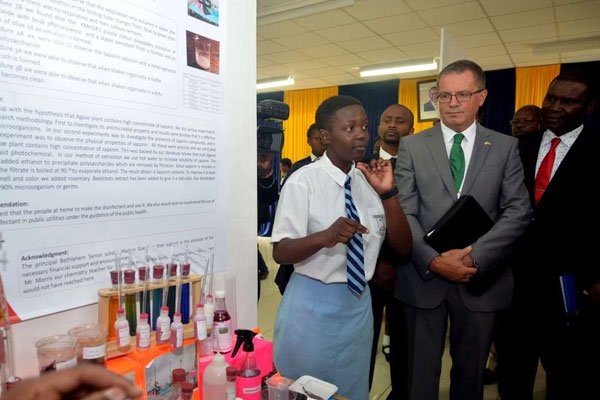
Bethlehem Senior School student Neema Glory explains to the Ireland Ambassador to Kenya Vincent O’Neill about her project during the BLAZE Safaricom Young Scientists Kenya launch at the Centre for Mathematics Science & Technology in Africa in Karen, Nairobi, on July 5, 2017. The centre seeks to create a culture that inspires students to excel and pursue careers related to science and mathematics. PHOTO | SALATON NJAU | NATION MEDIA GROUP
In Summary
The programme is being put in place by the Centre for Mathematics, Science and Technology Education in Africa.
A special classroom is set to be established in selected secondary schools across the country as the government makes efforts to promote innovation among students at an early age.
At such a centre, dubbed the ‘Makerspace’, students pursuing Science, Technology, Engineering and Mathematics will innovate and enjoy a hands-on approach to teaching and learning.
INVENT
Students in the schools will carry out activities such as 3D printing, laser cutting, soldering, electronics and robot building.
They will learn about electricity and circuits, sewing and woodwork. They will also be involved in inventing.
The programme is being put in place by the Centre for Mathematics, Science and Technology Education in Africa (CEMASTEA)
CAREER
It seeks to create a culture that inspires students to excel and pursue careers related to science and mathematics.
The Centre’s Director, Mr. Stephen Njoroge, said the special classrooms will enable students to share resources and knowledge, work on projects and network.
“This is a space for students with a maker mindset where they can come together and create something out of nothing,” Mr. Njoroge said.
By Augustine Oduor | Published Sat, July 22nd 2017 at 00:00, Updated July 21st 2017
Mathematics and the science subjects have for a long time been branded difficult and boring. But a new programme aims to break this myth. The government has rolled out an ambitious scheme to make the subjects easy and enjoyable.
At least two model secondary schools have been selected in every county to champion best learning practices and create a positive attitude towards the subjects for others to copy.
The science, technology, engineering and mathematics (STEM) programme is being rolled out by the Centre for Mathematics, Science and Technology Education (CEMASTEA).
Appropriate knowledge
A government brief seen by Saturday Standard says the main objective is to nurture students to become effective lifelong learners equipped with appropriate knowledge, generic skills as well as values and attitudes necessary for facing 21st century challenges.
Through the use of modern and interactive learning materials, the programme is expected to improve students’ attitude, achievement and confidence, and trigger creativity.
Education Cabinet Secretary Fred Matiang’i said the STEM Model Schools intervention programme will enhance learners’ capability in sciences and mathematics.
The ministry allocated CEMASTEA Sh32 million in the 2016/17 financial year to implement the project. And in 2017/18, the Centre has been allocated Sh58 million. Overall, 94 schools have been identified for the initial phase of the project.
The ministry allocated CEMASTEA Sh32 million in the 2016/17 financial year to implement the project. And in 2017/18, the Centre has been allocated Sh58 million. Overall, 94 schools have been identified for the initial phase of the project.
Dr. Matiang’i already released a set of equipment to the first lot of 47 schools for easy teaching and learning. “The ministry is distributing STEM equipment to the first batch of schools under STEM Education Model Schools Intervention Programme,” he said.
Each of the selected schools will receive a laptop, LCD projectors, digital cameras, white-boards, light microscopes and photometers. Other equipment procured for the model schools are biological models, preserved specimens, Liebig condensers, Hoffman’s Apparatus, atomic models, fractionating columns, electronic balance, cathode ray oscilloscopes, ammeters and volmeters. Micrometer screw gauges, thermometers, stop watches, galvanometers, magnets, lenses, scientific calculators, mobile graph boards, chalkboard geometry sets, globes, mathematical shapes, wire models and nets are also some of the equipment listed to be sent to schools.
CEMASTEA director Stephen Njoroge said the equipment and materials are essential to teaching and learning yet few schools can afford them.
Improve performance
“We are giving the equipment to schools to support them in improving performance and for experiential learning. Schools are expected to use 21st Century teaching approaches that incorporate inter-disciplinary ICT integration and inquiry based learning (IBL),” said Mr Njoroge.
He said a baseline study conducted by CEMASTEA revealed that schools tend to restrict learners’ access to available equipment. Students in STEM schools will be empowered to try out things and nurture ideas that can be commercialised in future.
It emerged that only 22 per cent of students undertaking university education in Kenya pursue courses in STEM, compared to 70 per cent of students in Asian Tigers such as South Korea and Singapore.
The introduction of STEM Model Schools is as a response to a shortage of graduates in the STEM field and for enhancing innovation, critical thinking and problem-solving skills.
Read more at: https://www.standardmedia.co.ke/article/2001248588/new-plan-to-make-maths-and-sciences-interesting
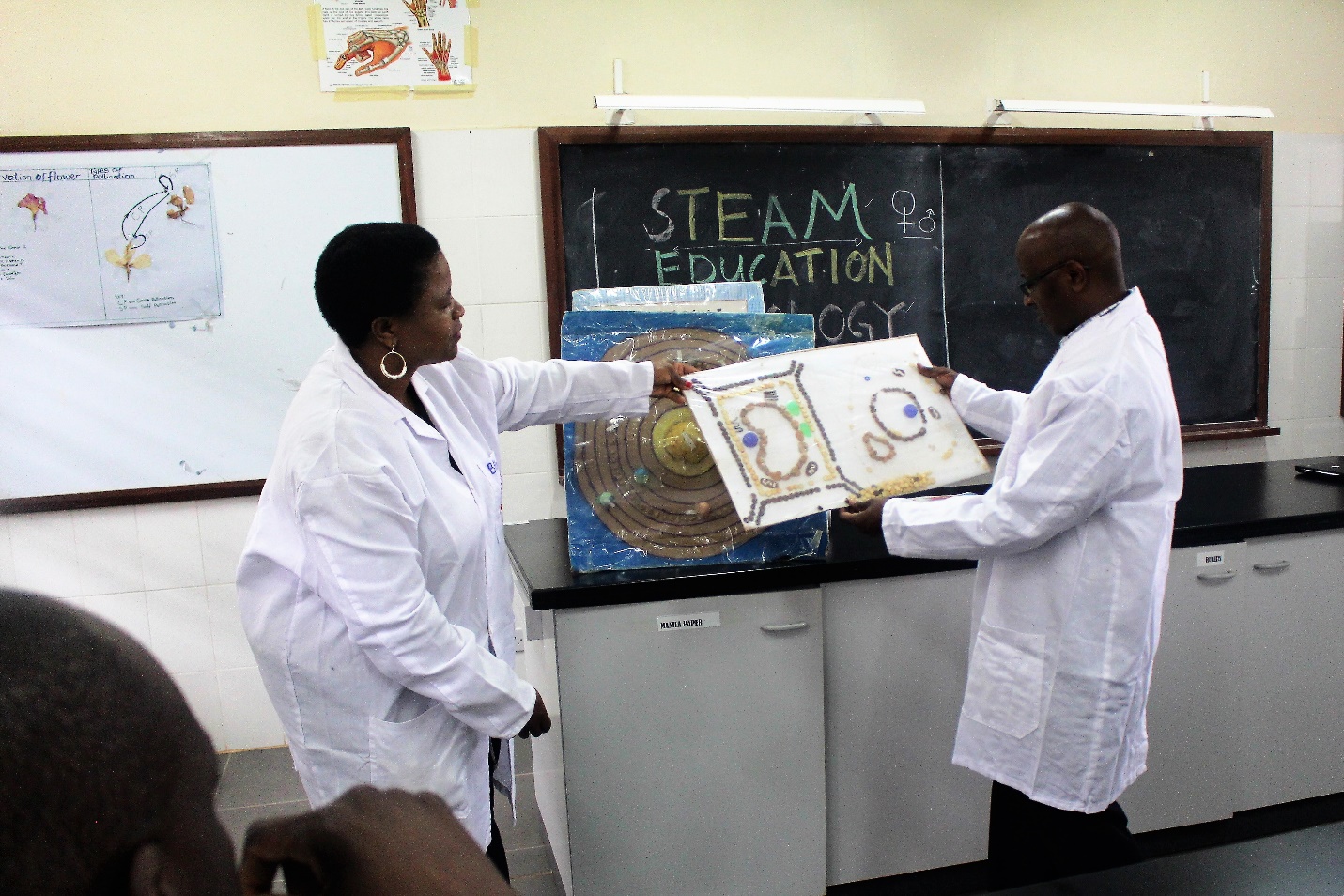
A participant from South Africa showing Mr. Thuo Karanja National Trainer Biology- CEMASTEA some of the innovative ways to demystify topic Cell Division
By Joe Ombuor | Published Thu, August 3rd 2017 at 11:21, Updated August 3rd 2017
NAIROBI, KENYA: Teachers have been urged to make use of digital social media platforms such as WhatsApp, Facebook and others to create networks to learn from each other while sharing different challenges at national and regional levels.
Kenya’s ambassador and permanent representative to UNESCO Prof. George Imbanga Godia said during regional teachers training programme in Nairobi that UNESCO through its convening power and multi- sectoral offices in Africa had the capacity to support such networks.
Prof. Godia was officially closing the second Teacher regional teacher training for Africa at the Centre for Mathematics, Science and Technology Education in Africa (CEMASTEA) that brought together 80 participants from 10 countries across the African continent.
“Teaching is a continuous learning process and I encourage you to continue learning from each other after workshops such as this one. Become TeachHer ambassadors and strive to share what you have learnt with your students and colleagues in your countries,” he said.
Prof Godia described Science, Technology, and Engineering, Arts and Mathematics (STEAM) activities and careers that fuel the TeachHer programme as key accelerators of socio economic development of nations.
He said Science, Technology and Innovation (STI) would continue to play an important role in transforming African economies from natural resource to industrial based. “This can only be achieved with significant investment in STEAM related careers, still marked by a shortage of girls and women.
Remarked Prof. Godia: “Women make up a paltry 30 per cent of the world’s researchers and are more under-represented in engineering fields globally.
He said the lack of women in technology sectors has significant socio economic consequences with women losing an important tool for personal and economic empowerment while countries lose developmental opportunities as a result.
Prof Godia said the TeachHer initiative that is a private public partnership between UNESCO, the US Government and other partners aimed at creating a master corps of educators equipped to deliver innovative hands-on instruction for adolescent girls, opening doors in an area where women are greatly unrepresented.
He said it behooved female teachers to serve as role models for girl students to raise their interest in STEAM at an early age. And advised fathers to encourage their daughters to take up science subjects leading to professional careers in technical fields. “Girls develop resolve when told by their fathers that they can challenge men in any discipline,” he said.
Prof. Godia announced that Kenya would next year host the first Pan African high level conference on Sustainable Development Goals (SDGs), courtesy of UNESCO.
Participants in the training were drawn from Kenya, Ethiopia, Madagascar, Nigeria, South Africa, Senegal, Tanzania, Zambia and Zimbabwe. It was the second such training since TeachHer was launched in 2016.
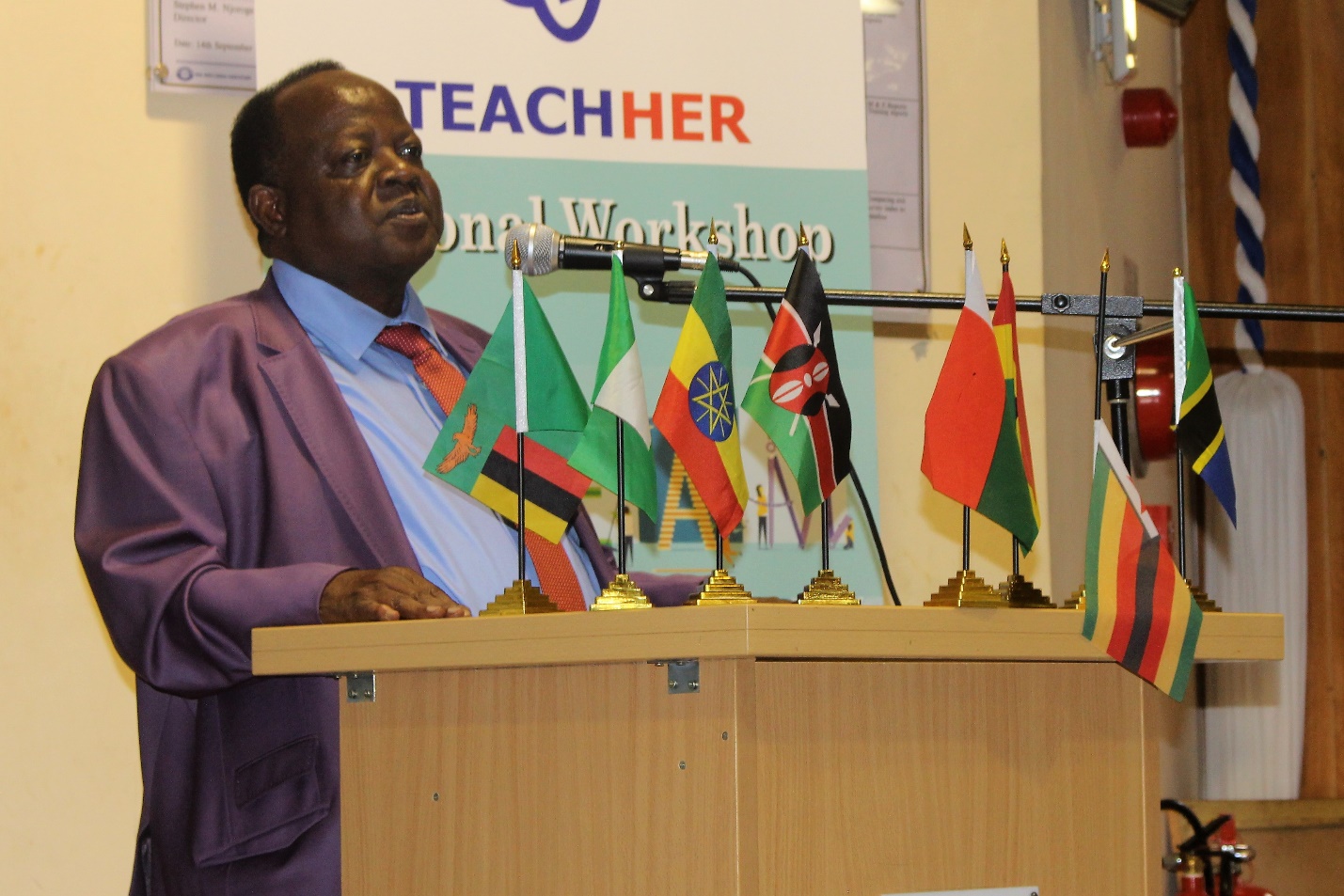
E. Prof. George Imbanga Godia was appointed as Ambassador and Permanent Delegate of the Republic of Kenya to UNESCO Paris speaking during the closing ceremony for the 2nd Teachher Training in Nairobi
By Joe Ombuor | Published Sat, July 29th 2017 at 17:46, Updated July 29th 2017
A regional teacher training forum in Nairobi has among other recommendations called for the use of female teachers as role models to help hone girls’ interest in science related subjects and subsequently, science oriented professions. The five-day training christened TeachHer brought together 80 male and female teachers from 10 African countries at the Centre for Mathematics, Science and Technology Education in Africa (CEMASTEA) in Karen. Calls were made for a deliberate effort to minimize the widely held but erroneous notion that science and technical disciplines are a preserve of the male gender.
A prototype known as ‘job shadowing’ that involves attaching interested girls under technical professionals to expose them to the field for brief periods was cited as an ideal affirmative action to influence their choice of scientific disciplines. “The girls are bound to learn and whet their interest in these male dominated areas while doing light duties such as organizing files or helping with clean up,” said Mr. Robert Masese, the Director of Secondary and Tertiary Education who officially opened the training on behalf of Education Cabinet Secretary Dr. Fred Matiang’i.
It was noted that fathers in particular have a key role to play in influencing their daughters into subjects exposing them to science based professions such as engineering, architecture, medicine and others. He local praised girls’ schools that had demystified science subjects including mathematics by competing effectively and beating boys’ schools, giving the example of Pangani Girls High School in Nairobi that is a unrivalled in Mathematics.
“We have schools like Kenya High School, a girl’s institution in Nairobi where wood work thought to be a sanctuary of boys features among the best performed subjects,” noted Mr. Masese.
He said time when women sat back and watched men take on technical challenges was long gone.
Dr Matiang’i in a speech read by Mr. Masese thanked the Paris based US mission to United Nations Educational, scientific and Cultural Organization (UNESCO) for funding the programme that would go a long way in improving Science, Technology, Engineering and Mathematics (STEAM) education for girls through learner centered teaching and learning practices.
He acknowledged the existence of a significant gender disparity in STEAM education that has to be narrowed in order to provide adequate and balanced work force for private and public sectors for rapid development. “We need to invest in preparing young women to take up 21st century STEAM careers,” said Dr Matiang’i.
Towards that end, disclosed Dr. Matiang’i, the ministry of education through the participation of CEMASTEA had rolled out a Science, Technology, Engineering and Mathematics (STEM) programme established in 94 model secondary schools, two each of 47 counties across the country. “The programme is expected to help activate, train, inspire and sustain more students particularly girls willing to enroll in STEAM fields,” said Dr Matiang’i.
The Director of CEMASTEA Mr. Stephen Njoroge hailed Kenya’s Ambassador and Permanent Representative to UNESCO Prof. George Godia who graced the occasion for lobbying to bring the second edition of TeachHer to Nairobi. He advised the beneficiaries to share their experience widely with colleagues in their respective countries.
Mr. Njoroge called on African nations to appreciate its intelligentsia. “Our nations must contrive ways to accommodate its intelligentsia instead of punishing them for possessing critical minds. That is important if manufacturing and technology are to take hold on the continent,” he noted.
The Director said Intelligent people were easily bored and should not be neglected if for reasons including impatience, they do not complete official education. “These in the West are the Bill Gates, Richard Branson and Steve Jobs of this world. Here, we waste instead of harness their brains,” said Mr. Njoroge.
Participants in the training were drawn from Kenya, Ethiopia, Madagascar, Nigeria, South Africa, Senegal, Tanzania, Zambia and Zimbabwe. It was the second such training since the first edition was launched last year in Addis Ababa, Ethiopia.
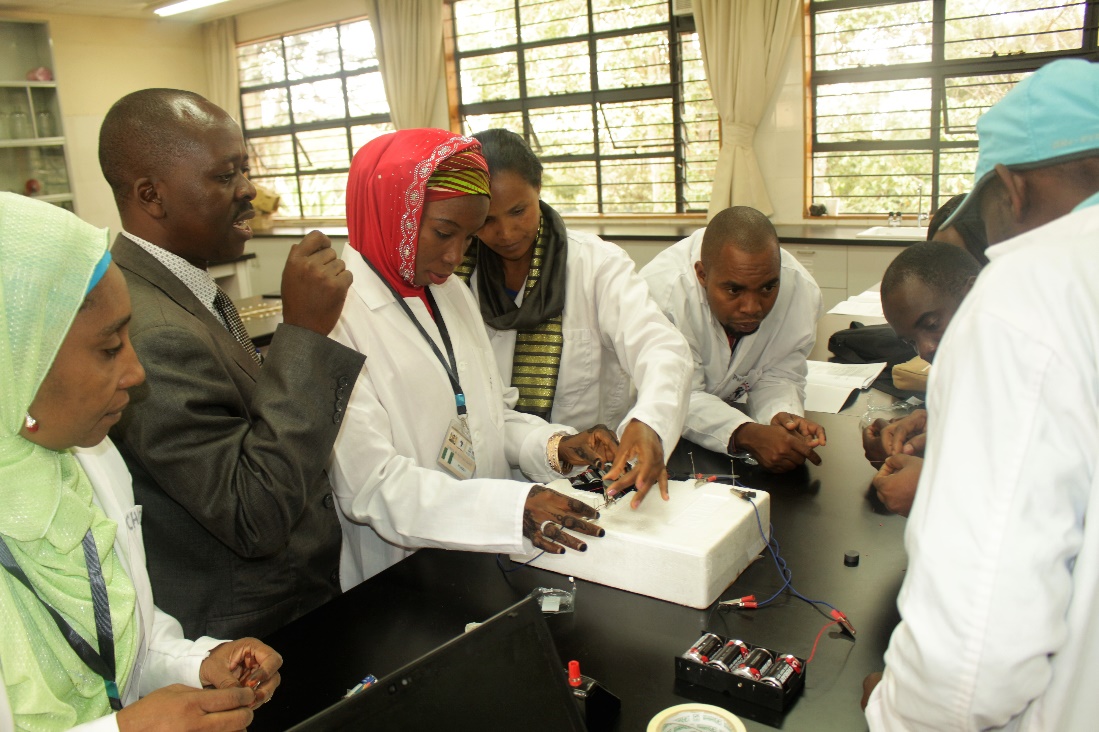
Participants taking part in a Physics activity at the 2nd Teachher Training workshop held CEMASTEA
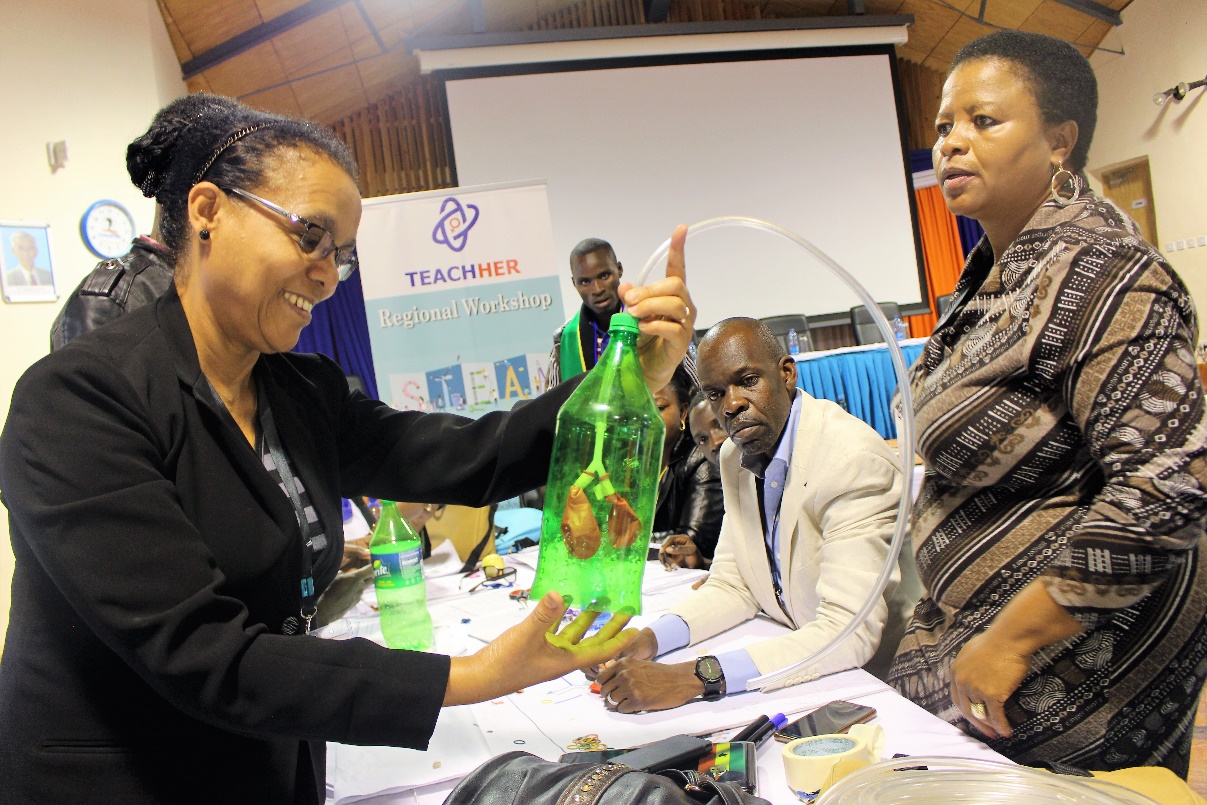
Participants taking part in a Biology activity at the 2nd Teachher Training workshop held CEMASTEA
Technical classrooms set for high schools
Special classrooms for technical skills will be established in selected secondary schools in an effort to promote innovation among students at an early age.
Dubbed the ‘Makerspace’, students pursuing science, technology, engineering and mathematics (STEM) subjects will be able to innovate and enjoy hands-on approach to teaching and learning.
This will enable them to carry out activities such as coding, 3D printing, laser cutting, soldering, electronics, robot building or robotics and wood work.
The plan is being fronted by the Centre for Mathematics, Science and Technology Education in Africa (CEMASTEA), a State agency, which initially promoted science and mathematics through teacher training courses.
The centre’s director, Stephen Njoroge, said the special classrooms will enable students to share resources and knowledge, work on projects and network.
“This is a space for students with a maker mindset where they can come together and create something out of nothing and explore their own interests,” said Mr. Njoroge.
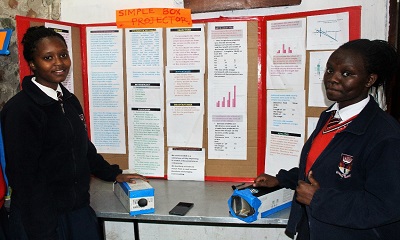 Ngara Girls students showing a simplified version of a projector during a school visit by participants from the 2nd TeachHer training
Ngara Girls students showing a simplified version of a projector during a school visit by participants from the 2nd TeachHer training
Concerted efforts by the Ministry of Education through Centre for Mathematics, Science and Technology in Africa (CEMASTEA) to increase the uptake of mathematics and science subjects in the country was boosted by distribution of STEM equipment to the first batch of STEM schools. 
Fred Matiang’i Cabinet Secretary for Ministry of Education is welcomed by Mr. Stephen Njoroge, Director CEMASTEA. The CS, was the chief guest during the launch of the 2nd batch of STEM schools and flagging off the STEM equipment for the 1st batch of STEM schools at CEMASTEA, Nairobi
Speaking at the ceremony, Mr. Stephen Njoroge, Director CEMASTEA, defined a STEM school as one that learners are interested in science, manages the resources that they have been provided with efficiently and one that has a program that encourages leaners to inculcate societal values. He further defined Science, Technology, Engineering and Mathematics (STEM) as an interdisciplinary facet that provides students with a hands-on experience. He urged principals to allow learners to interact with STEM equipment donated by the Ministry of Education or other partners.
Stephen Njoroge Director CEMASTEA
Dr. Fred Matiang’i, Cabinet Secretary for Ministry of Education, who was the chief guest commissioned the launch of the second batch of STEM schools and flagged off the distribution of equipment for the first batch of STEM schools.

Dr. Fred Matiang’i flags off the STEM equipment for the first batch of STEM schools at the foreground is the Director Mr. Njoroge CEMASTEA and senior education officers
The CS, commended CEMASTEA for saving and purchasing STEM equipment worth thirty- two million shillings. He further directed two hundred and fifty-eight million shillings set aside for science equipment in his ministry to be channeled to the CEMASTEA to purchase additional equipment for schools. The CS added that the equipment he was launching would go a long way in alleviating some of the problems principals encounter due to lack of equipment.
Dr. Fred Matiang’i hands over a list of items during the distribution of STEM equipment to Ms. Consolata Kimuya, Principal, Buruburu Girls High School at CEMASTEA
Dr. Matiang’i, challenged CEMASTEA to conduct monitoring and evaluation of the ninety-four schools that were being supported by the Ministry of Education and CEMASTEA and the impact they have within their communities.
Dr. Fred Matiang’i Cabinet Secretary for Ministry of Education speaking at CEMASTEA during the launch of the second batch of STEM Schools
The equipment purchased will be used as teaching and learning of STEM subjects. Some of the items include Hoffmans apparatus, fractionating columns, voltmeters, Cathode Ray Oscilloscope (CRO), Binocular light microscopes, potometers, scientific calculators, mobile graph boards, set of mathematical shapes plus geoboard, LCD projectors, laptops and textbooks. Principals from the 1st batch of STEM schools were in hand to receive the equipment. This equipment will impact more than 43,000 learners across Kenya.
Nancy Nui, Dean of Mathematics, CEMASTEA (right) hands over STEM equipment to Mrs.Mary Principal Kapropita Girls High School

